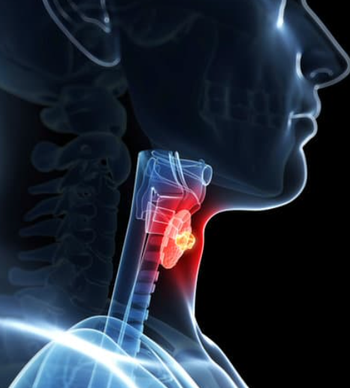
Novel Gene Found Related to Cowden Syndrome, Thyroid Cancer
Researchers identified a novel gene that may predispose individuals to Cowden syndrome, an inherited condition that carries an especially high risk for various epithelial cancers and especially thyroid cancer.
Researchers identified a novel gene that may predispose individuals to Cowden syndrome, an inherited condition that carries an especially high risk for various epithelial cancers and especially thyroid cancer. The gene, which had previously been associated with a rare type of anemia but not with cancer, may help with predictive genetic testing and risk assessment.
Cowden syndrome is difficult to diagnose and recognize; it is characterized by development of multiple hamartomas and an increased lifetime risk of breast, thyroid, endometrial, and other cancers. In previous work, the gene PTEN was identified as a susceptibility gene for Cowden syndrome, with germline mutations occurring in 85% of individuals. Certain mutations increase the risk of thyroid cancer by 45-fold, according to researchers led by Charis Eng, MD, PhD, of the Cleveland Clinic.
In the new study, the researchers sought to identify previously undescribed cancer-predisposing genes in a Cowden syndrome–affected family presenting with different types of related cancers-in particular thyroid cancer, the authors wrote-across four generations. Results were
They found that all affected family members shared three genes with heterozygous missense variants, and one-in the gene SEC23B-was found to be “the most critical germline variant” in the family.
Next, the researchers looked for the specific SEC23B variation (c.1781T>G [p.Val594Gly]) in a group of 96 other individuals with Cowden syndrome or “Cowden-like” presentation who had thyroid cancer or other cancer types including breast and endometrial carcinomas. They found deleterious SEC23B variants in 3.1% (3 of 96) of the individuals, and papillary thyroid cancer was found in all 3 of those.
The connection was further confirmed using a series of patients with apparently sporadic cancers from the Cancer Genome Atlas. The same germline variants were found in papillary thyroid, breast invasive, and uterine corpus endometrioid carcinomas; the highest frequency was seen in thyroid patients, at 4%.
“Our observations reveal that a subset of Cowden syndrome and Cowden syndrome–like individuals without germline mutations in known genes might be accounted for by germline variants to SEC23B,” the authors concluded. They wrote that additional Cowden syndrome–relevant genes such as this one could “improve molecular diagnosis, especially predictive testing, cancer risk assessment, genetic counseling, and clinical management.”
Newsletter
Stay up to date on recent advances in the multidisciplinary approach to cancer.
Related Content



FDA Drops REMS Requirement for Vandetanib in Medullary Thyroid Cancer


















































